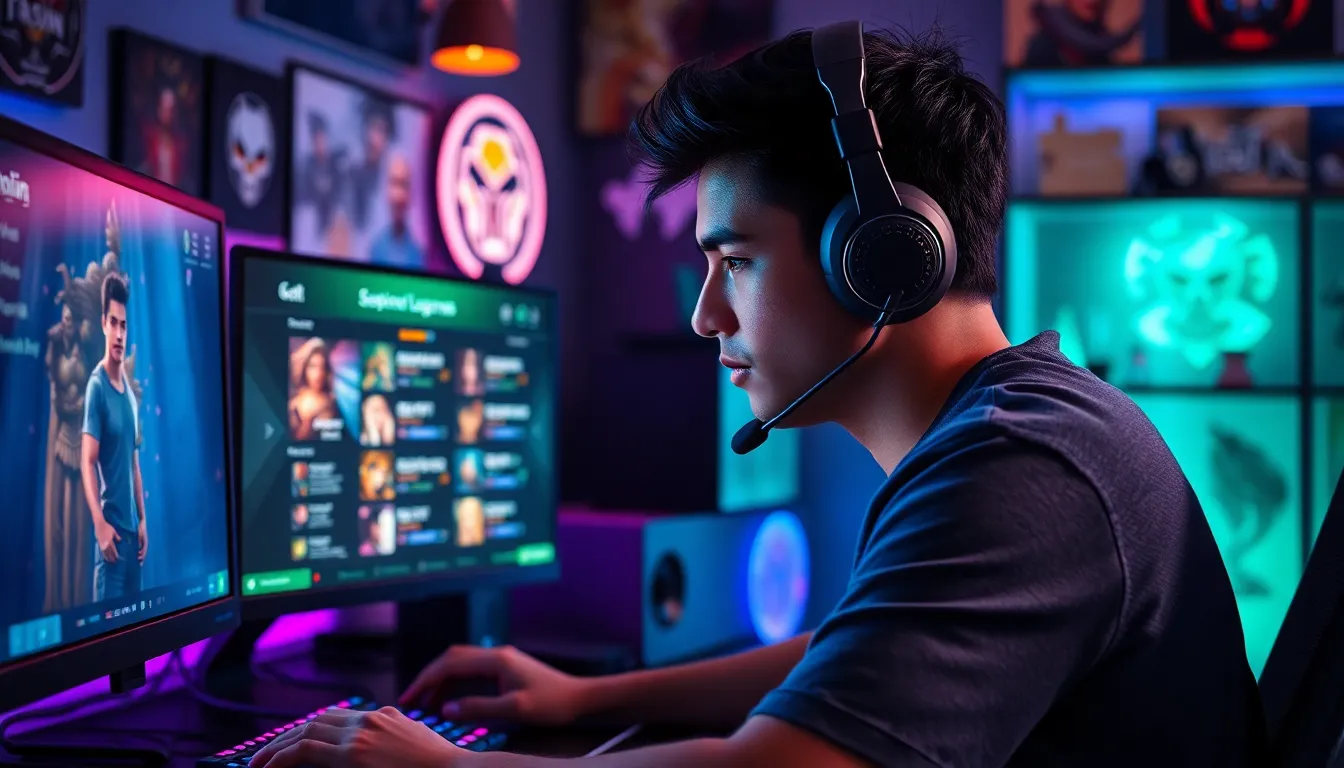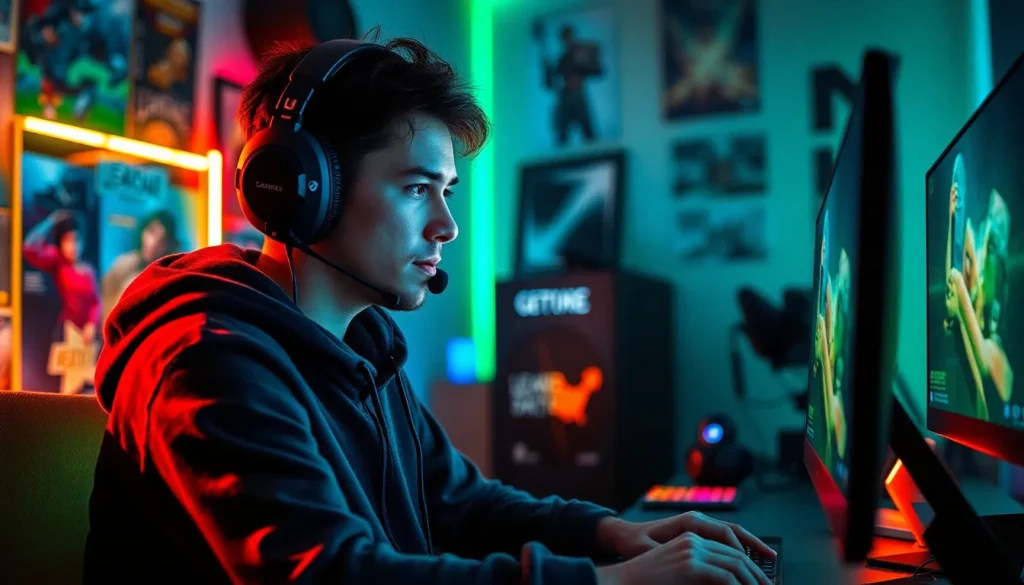Table of Contents
ToggleIn the competitive world of League of Legends, mastering strategy is crucial for climbing the ranks. Players often find themselves overwhelmed by the game’s complexity, but with the right tips, anyone can enhance their gameplay. Understanding the nuances of map control, champion synergy, and team dynamics can turn the tide of battle in their favor.
Whether you’re a seasoned veteran or a newcomer, refining your approach can lead to more victories. This article explores essential League strategy tips that will empower players to make smarter decisions, communicate effectively, and outmaneuver opponents. By implementing these strategies, players can elevate their game and enjoy a more rewarding experience on the Rift.
Understanding League Strategy
Mastering strategy in League of Legends is crucial for improving gameplay, enhancing teamwork, and climbing ranks efficiently. Effective strategies can significantly impact match outcomes, providing a foundation for success.
The Importance of Strategy in League
Strategy in League of Legends shapes gameplay and influences match results. Strategic planning allows players to make informed decisions, adapt to opponents, and capitalize on map advantages. Prioritizing objectives, managing resources, and coordinating with teammates are vital components. Players who focus on strategy can elevate both personal performance and team dynamics, leading to a competitive edge.
Key Elements of a Winning Strategy
- Map Awareness: Maintain constant vigilance of the map. Recognizing enemy positions and tracking objectives fosters better decision-making. Awareness enables players to anticipate movements and capitalize on enemy mistakes.
- Champion Synergy: Select champions that complement team compositions. Understanding individual abilities and how they synergize creates powerful combinations. Effective team composition maximizes strengths while mitigating weaknesses.
- Objective Control: Prioritize taking down towers, dragons, and Baron Nashor. Securing objectives grants experience, gold, and buffs, significantly enhancing the team’s chances of success. Players must coordinate efforts to ensure collective focus on these goals.
- Vision Control: Invest in wards and sweepers to maintain control over key areas. Adequate vision prevents surprise attacks and provides crucial information on enemy movements. Regularly updating vision can shift the game’s momentum in a team’s favor.
- Adaptability: Adjust strategies based on the evolving match landscape. Analyzing opponents’ tactics and implementing counterstrategies allows teams to respond effectively. Flexibility can turn the tide of battles and secure victories.
- Communication: Foster open and clear communication with teammates. Sharing information about enemy locations, summoner spell cooldowns, and planned maneuvers enhances coordination. Strong communication minimizes mistakes and optimizes team synergy.
By focusing on these key elements, players can develop effective strategies that underpin successful gameplay and create a pathway to higher ranks in League of Legends.
Champion Selection

Champion selection plays a critical role in determining the outcome of a match in League of Legends. Strategic choices can significantly influence team composition and overall performance.
Choosing the Right Champion
Choosing the right champion involves evaluating individual playstyle, role assignment, and team needs. Each champion has unique abilities, strengths, and weaknesses that affect gameplay. Players should consider the following factors when selecting a champion:
- Personal Skill Preference: Match the champion to preferred mechanics, such as mobility, zoning, or burst damage.
- Team Composition: Opt for champions that fill gaps in existing team roles, whether tank, support, or damage dealer.
- Map Strategy: Select champions that excel in specific lanes or environments, leveraging their strengths against opponents.
- Game Phase: Favor champions that are strong in early or late game, depending on the team’s overall strategy.
- Adaptability: Choose champions that can effectively respond to changing match dynamics, allowing for flexibility in gameplay.
Synergies and Counters
Understanding champion synergies and counters enhances strategic depth during the selection process. Synergies refer to combinations of champions that amplify each other’s strengths. Counters involve selecting champions that exploit weaknesses in enemy picks. Important considerations include:
- Complementary Abilities: Pair champions whose abilities enhance teamfight potential, such as engaging and follow-up crowd control.
- Role Coverage: Ensure the team covers essential roles like initiation, CC, and healing to create a well-rounded composition.
- Counter Picks: Select champions known to overpower or negate the effects of opposing champions, effectively swinging matchups.
- Meta Awareness: Be aware of current meta trends, understanding which champions are particularly strong or weak in the current patch.
- Communication: Discuss choices with teammates to establish a cohesive strategy that maximizes strengths and minimizes vulnerabilities.
Champion selection remains a fundamental aspect of League of Legends strategy, impacting overall team performance and individual gameplay success.
Map Awareness
Map awareness proves crucial in League of Legends, as it allows players to make informed decisions based on the current game state. Maintaining vision and understanding map flow leads to better team coordination and strategic positioning.
Importance of Vision Control
Vision control elevates gameplay by revealing enemy movements and objectives. Warding key areas provides critical information, enabling players to avoid ganks and set up ambushes. Players who prioritize vision control reduce uncertainty during engagements, allowing for strategic counterplays and improved team fights. Consistent vision coverage fosters an environment where teams can seize opportunities and execute objectives safely.
Key Locations to Ward
Warding specific map locations enhances overall game awareness. Here are essential spots for vision:
- Dragon Pit: Placing wards here helps track enemy movement and provides safety when attempting dragon control.
- Baron Nashor Area: Warding this area secures vision for potential team fights and objective attempts.
- River Entrances: Vision near river chokepoints alerts players to incoming threats or opportunities for flanking.
- Jungle Entrances: Wards at jungle entrances provide visibility on enemy rotations and assist in preventing ganks.
- Lane Bushes: Warding bushes in lanes ensures safety against surprise attacks and enables effective trading.
Strategically positioning vision grants players the upper hand, facilitating informed decision-making and enhancing team synergy.
Team Coordination
Team coordination plays a vital role in League of Legends. Effective collaboration among teammates enhances overall performance and increases the chances of victory.
Communicating Effectively
Communicating effectively enhances team coordination. Players should use in-game chat and voice communication to share crucial information quickly. Team members can signal important actions, enemy positions, and strategies. Clear and concise communication helps avoid misunderstandings and allows for timely responses to dynamic game situations. Establishing a consistent language, such as calling out targets or objectives, streamlines teamwork. Regularly updating teammates about cooldowns, summoner spells, and map awareness further strengthens coordination and increases overall match awareness.
Role of Team Composition
Team composition significantly impacts match dynamics. Selecting champions that complement each other’s strengths creates a balanced team. A well-rounded composition typically includes a mix of tanks, damage dealers, and crowd control options. Teams should consider synergy when choosing champions to maximize effectiveness. For example, pairing high-damage champions with strong initiators allows for powerful engagements. Conversely, having adequate sustain ensures prolonged skirmishes and objectives. Counter-picking opponents with strategically selected champions neutralizes threats and creates advantageous scenarios. Understanding each player’s role within the composition reinforces team coordination and optimizes performance.
Adaptability in Play
Adaptability defines a player’s ability to adjust strategies based on the evolving dynamics of a match. Recognizing and responding to changes in the game flow enhances chances of success.
Reading the Game Flow
Reading the game flow involves analyzing opponents’ movements, objectives, and team compositions. Players should monitor key indicators, such as enemy positioning, resource allocation, and item builds. Understanding when to engage or retreat hinges on accurately interpreting these signals. For example, if an enemy team focuses on objectives like Dragon or Baron, players can adjust their strategy to counter them effectively. Recognizing when teammates require assistance or when to push lanes furthers successful adaptations, ultimately resulting in informed plays.
Adjusting Strategies Mid-Game
Adjusting strategies mid-game centers around real-time decision-making based on the current state. Players should assess their team’s strengths and weaknesses while considering the enemy’s performance. For instance, if facing an aggressive enemy team, players should play more defensively. Alternatively, if gaining an advantage, increasing aggression can create opportunities for picking off opponents. Communicating these adjustments with teammates ensures unified actions, whether it involves taking objectives, grouping for team fights, or farming safely. Balancing between conservative and aggressive plays solidifies adaptability, allowing teams to navigate through various challenges effectively.
Conclusion
Mastering strategy in League of Legends is essential for players aiming to elevate their gameplay and climb the ranks. By focusing on key aspects such as map awareness champion synergy and effective communication players can significantly enhance their performance. Adapting strategies based on the evolving dynamics of each match allows for more informed decision-making and better teamwork.
Investing time in understanding the nuances of champion selection and vision control can lead to a more cohesive team and improved outcomes. Ultimately embracing these strategies not only fosters individual growth but also contributes to a more enjoyable gaming experience. With dedication and practice players can unlock their full potential and achieve greater success on the Rift.







